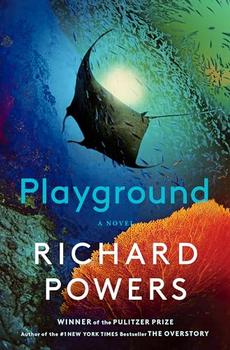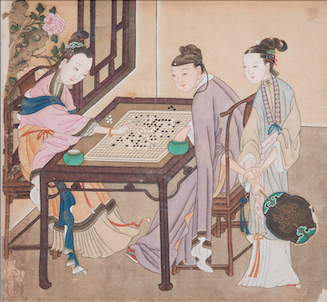Summary | Excerpt | Reading Guide | Discuss | Reviews | Beyond the book | Read-Alikes | Genres & Themes | Author Bio

A Novel
by Richard PowersA magisterial new novel from the Pulitzer Prize–winning and New York Times best-selling author of The Overstory and Bewilderment.
Four lives are drawn together in a sweeping, panoramic new novel from Richard Powers, showcasing the Pulitzer Prize–winning author of The Overstory at the height of his skills. Twelve-year-old Evie Beaulieu sinks to the bottom of a swimming pool in Montreal strapped to one of the world's first aqualungs. Ina Aroita grows up on naval bases across the Pacific with art as her only home. Two polar opposites at an elite Chicago high school bond over a three-thousand-year-old board game; Rafi Young will get lost in literature, while Todd Keane's work will lead to a startling AI breakthrough.
They meet on the history-scarred island of Makatea in French Polynesia, whose deposits of phosphorus once helped to feed the world. Now the tiny atoll has been chosen for humanity's next adventure: a plan to send floating, autonomous cities out onto the open sea. But first, the island's residents must vote to greenlight the project or turn the seasteaders away.
Set in the world's largest ocean, this awe-filled book explores that last wild place we have yet to colonize in a still-unfolding oceanic game, and interweaves beautiful writing, rich characterization, profound themes of technology and the environment, and a deep exploration of our shared humanity in a way only Richard Powers can.
As the narrative jumps unpredictably back and forth through time and space, Powers explores diverse themes such as friendships gained and lost; humanity's impact on the planet, especially its oceans; neocolonialism; sexism in the sciences; the development and future of artificial intelligence; and many others. If this all makes it sound like Playground is dense and complicated, there's a reason for that. But Powers' genius is his ability to form a cohesive and absorbing narrative from what at first seems to be a disorienting, unrelated mishmash of ideas...continued
Full Review
 (690 words)
(690 words)
(Reviewed by Kim Kovacs).
In Richard Powers' novel Playground, best friends Todd and Rafi become obsessed with the board game Go (often capitalized in English to differentiate it from the common verb), and the pastime plays a large role in the narrative. According to the National Go Center, "Beyond being merely a game, Go can take on other meanings to its devotees: an analogy for life, an intense meditation, a mirror of one's personality, [an] exercise in abstract reasoning, a mental 'workout' or, when played well, a beautiful art in which black and white dance in delicate balance across the board."
 Outwardly, Go is a relatively simple game that even young children can learn, although its endless permutations mean one might never master it. It's played on a ...
Outwardly, Go is a relatively simple game that even young children can learn, although its endless permutations mean one might never master it. It's played on a ...

If you liked Playground, try these:

by Louise Erdrich
Published 2025
In this stunning novel, Pulitzer Prize and National Book Award–winning author Louise Erdrich tells a story of love, natural forces, spiritual yearnings, and the tragic impact of uncontrollable circumstances on ordinary people's lives.

by Fernanda Trias
Published 2025
Winner of the Uruguayan National Literature Prize for Fiction, the Bartolomé-Hidalgo Fiction Prize, and the Sor Juana Inés de la Cruz Literature Prize.